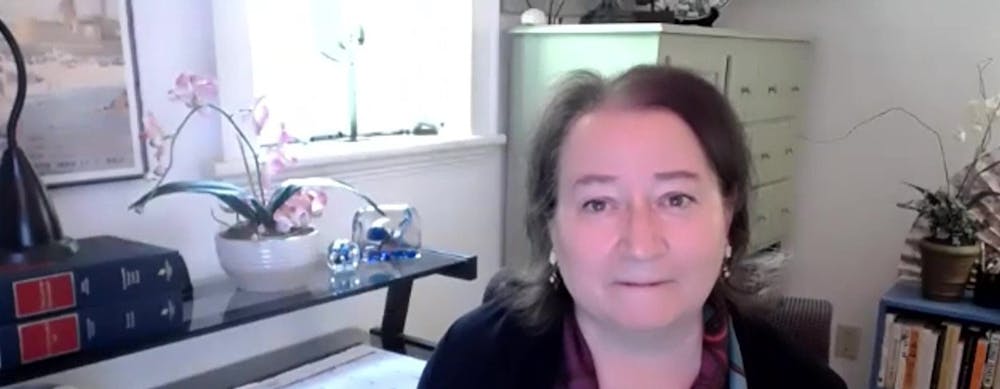The Bloomington Faculty Council presented updates from the employee benefits committee, voted on a resolution on the use of Online Course Questionnaire data from fall 2020 and discussed admissions reports from 2020 during Tuesday’s virtual meeting.
Provost Lauren Robel first recognized the efforts to register first-time voters by the Political and Civic Engagement Program and other student groups.
She then addressed the COVID-19 pandemic, attributing IU’s lowering number of positive cases to testing in partnership with the city and county. Greek house numbers have seen a decrease, and residential housing is at only 1.18% positivity rate. Off-campus non-greek housing has a reported 0.5% positivity rate. No positive cases have been detected in graduate and professional students or faculty members.
Robel said the overall prevalence of the coronavirus in the community is around 0.7%, and IU will continue to sample all greek houses and residence halls.
IU Vice President for Human Resources John Whelan continued the meeting with an update from the employee benefits committee. He covered health care trends and plans and recapped new benefits for 2020 such as the expansion of the Weight Watchers program. While this was previously a first-come, first-servedopportunity, IU has opened it up to all employees and their spouses who are on an IU Health plan.
Another new employee benefit is Livongo, which offers free support and services to help manage diabetes. Whelan said he is looking forward to evaluating other programs to offer employees in the future to manage pre-diabetes, high cholesterol and high blood pressure.
He also went over the new Employee Assistance Program plan with expanded mental health resources and access points, rolled out in February. This provides students and faculty with licensed mental health clinicians available 24 hours a day, seven days a week over the phone and regular communications to employees about new programs and resources.
The council voted on a resolution on the use of OCQ data from fall 2020. The resolution gives instructors the choice whether or not to include data collected through OCQs in tenure and promotion decisions, including those for the purpose of determining eligibility for retention and promotion.
The fourth section reads “Candidates for tenure and promotion have a presumptive right to put forward what they believe is the strongest, most accurate case on their own behalf, bearing in the mind that the strongest possible case may be, and often is, the most complete one.” The discussion comes from concern around how the COVID-19 pandemic has complicated teaching and learning.
J Duncan, chair of the Educational Policies Committee, said that change to the use of the OCQ, if any, would be as minimal as possible and that if adopted the resolution is not a change in policy, but rather guidance from the BFC.
One major point of concern brought up was the equity of the resolution and whether or not it was fair to let faculty members "cherry-pick" what parts of their OCQ feedback they presented when students don't get to choose which grades they show on their transcripts or to potential employers. Duncan acknowledged these concerns and said he wanted to further discuss equity for students in the matter, but he reinforced that the best presentations of feedback and grades tend to be the most complete.
The vote on the matter was just about evenly divided among council members. Because the vote happened in the chat with members either typing "yes" or "no," exact numbers were unclear, but the vote fell somewhere around 30-28. Robel said she thinks that for a resolution to have an effect, an almost evenly-divided council does not give much guidance, and that if it passed it was with a small margin. She plans to report the discussion and the narrow vote to the deans and the vice provost for further discussion.
The meeting also included a presentation on 2020 admissions reports, specifically focusing on the freshman class of 2024. There are 1,507 minority students enrolled this year, a record number, and students come from 33 countries and six continents around the world. David Johnson, vice provost for enrollment management, said there would be increased efforts in the future to attract more out-of-state and underrepresented students. Johnson added that in total there are 1,200 students exclusively online this year due to the pandemic.
The next meeting is scheduled for Oct. 20.




